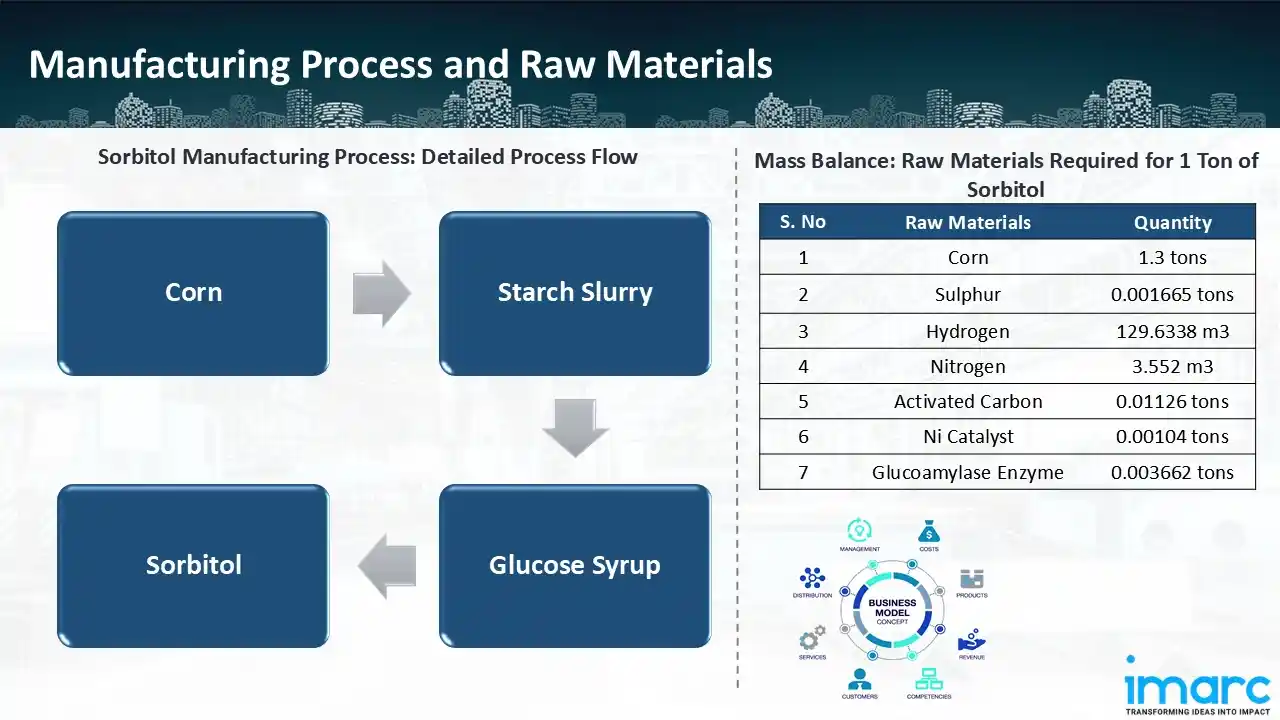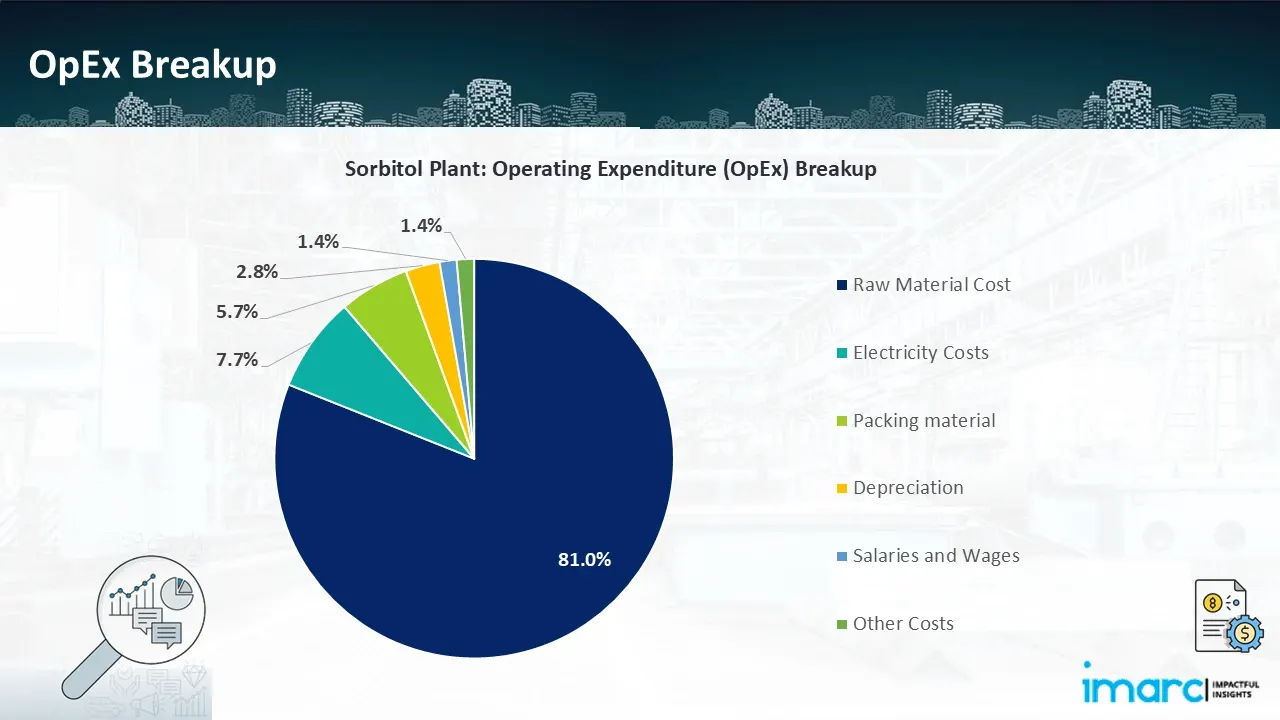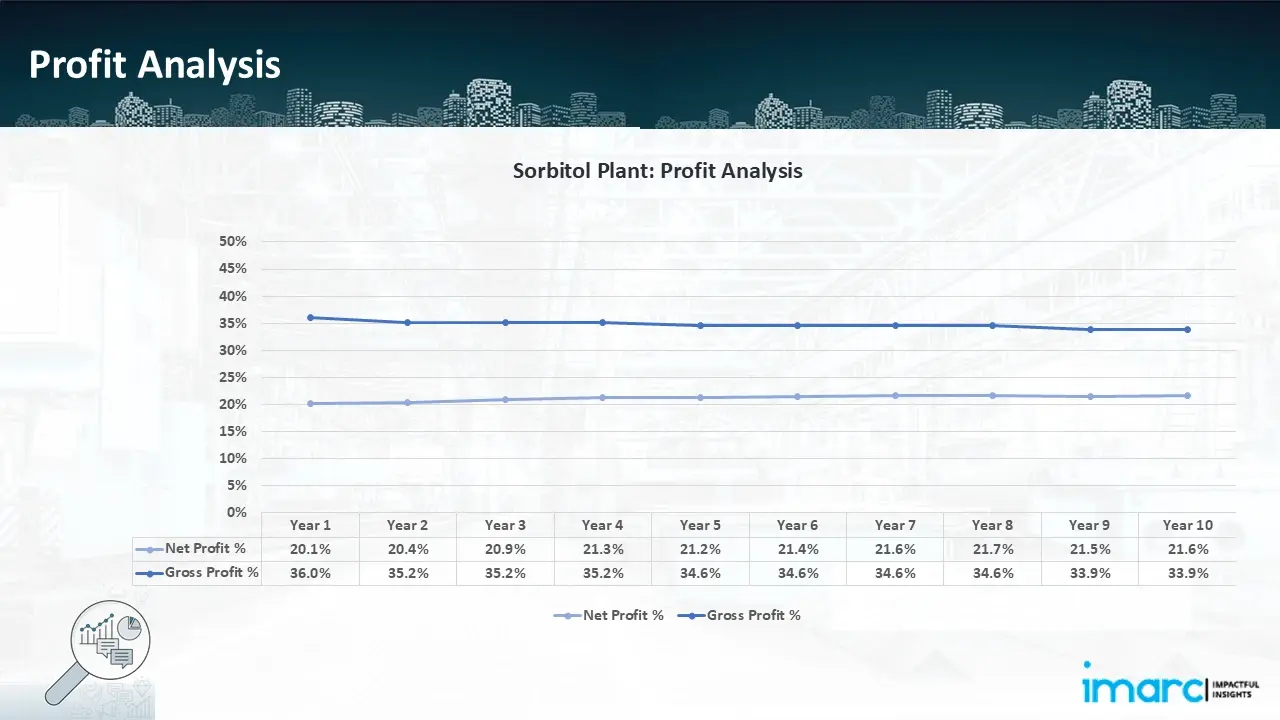Investment and Cost Structure of Sorbitol Manufacturing Plant: A Detailed Cost Model
_11zon.webp)
What is Sorbitol?
Sorbitol is a sugar alcohol widely used as a sweetener, humectant, and stabilizer in food, pharmaceuticals, and cosmetics.
Key Applications Across Industries:
It is made commercially by hydrogenating glucose and is naturally present in fruits like apples and pears. Because of its mild sweetness, low glycaemic index, and ability to retain moisture, sorbitol is a popular ingredient in skincare, dental care, and sugar-free goods. It is also an essential component of industrial processes and a laxative in medical applications.
What the Expert Says: Market Overview & Growth Drivers
According to an IMARC study, the global sorbitol market size was valued at 2.76 Million Tons in 2024. Looking ahead, the market is expected to grow at a CAGR of approximately 1.12% from 2025 to 2033, reaching a projected volume of 3.03 Million Tons by 2033.
The growing need for sugar alternatives in the food and beverage sector is the main driver of the sorbitol market, but there are other important aspects as well. Sorbitol is a common sweetener in sugar-free and diabetic-friendly goods since it has a low glycaemic index and few calories. Furthermore, because of its humectant qualities, it is a necessary ingredient in cosmetics and personal care products, especially mouthwash and toothpaste. Sorbitol's application in syrups, laxatives, and tablet formulations makes the pharmaceutical sector a major contributor to the market's expansion. Further driving demand for natural and low-calorie sweeteners is growing consumer awareness of wellness and health trends. Sorbitol is used in bio-based chemicals and surfactants in the industrial sector, which is in line with the global trend towards sustainable products. Growing uses in biofuels, paper, and textiles increase demand for it. Furthermore, sorbitol's market expansion is being supported by cost-effectiveness improvements brought about by advancements in production technology.
Case Study on Cost Model of Sorbitol Manufacturing Plant:
Objective
One of our clients has approached us to conduct a feasibility study for establishing a mid to large-scale sorbitol manufacturing plant in India.
IMARC Approach: Comprehensive Financial Feasibility
We have developed a detailed financial model for the plant's setup and operations. The proposed facility is designed with a production capacity of 80,000 tons of sorbitol per year.
Manufacturing Process: Corn is the main raw material used in the sorbitol synthesis process. The starch extracted from maize is used as the starting point for the synthesis of sorbitol. Amylase enzymes cause the extracted starch slurry to undergo enzymatic hydrolysis, which converts it to glucose syrup. To produce high-quality sorbitol, a high-purity glucose solution is guaranteed by this conversion. The glucose syrup next passes through a crucial process called hydrogenation, in which it reacts with hydrogen at high pressure and temperature while a nickel catalyst is present. Through this process, glucose is reduced to sorbitol, a sugar alcohol that has humectant and sweetening qualities. After the sorbitol is created, any remaining catalysts or contaminants are eliminated through purification. To get the appropriate consistency and quality, the purified sorbitol is subsequently concentrated and standardised. In the food, pharmaceutical, cosmetic, and industrial sectors, it is then packaged for distribution and stored in either liquid or crystalline form, depending on the intended use.

Get a Tailored Feasibility Report for Your Project Request Sample
Mass Balance and Raw Material Required: The primary raw materials utilized in the sorbitol manufacturing plant include corn, sulphur, hydrogen, nitrogen, activated carbon, Ni catalyst and glucoamylase enzyme. To manufacture 1 ton of sorbitol, we require 1.3 tons of corn, 0.001665 tons of sulphur, 129.6338 m3, 3.552 m3 of nitrogen, 0.01126 tons of activated carbon, 0.00104 tons of Ni catalyst, and 0.003662 tons of glucoamylase enzyme.
List of Machinery:
The following equipment was required for the proposed plant:
- Belt Conveyor
- Drum Screen
- Absorption Tower
- Tanks
- Feeding Slot
- Impregnating Vessel
- Heater
- Feeding Slot
- Evaporator
- Lye Tank
- Watershed Screen
- Storage Bucket
- Grind Storage Tank+ Stir
- Germ Separator
- Water Screen
- Grinder
- Germ separator
- Grinding Charging Tank
- Curve Screen
- Grinder
- Germ Washing Curve Screen
- Germ Dehydrator
- Germ Filtrate Tank
- Drying Machine
- Screw Conveyor
- Cyclone Separator
- Fiber Washing Tank
- Washing Curve Screen
- 2/7 Washing Curve Screen
- Composite Curved Screen
- Fiber Dehydrator
- Dryer Machine
- Screw Conveyor
- Cyclone Separator
- Crude Starch Milk Tank
- Stone Remover
- The Main Separator
- Starch Milk Tank+ Stir
- Starch Hydrocyclones
- Refined Starch Milk Tank+ Stir
- Gluten tank
- Separator
- Air Float
- Vacuum Drum Filter
- Steam Separator
- Screw Conveyor
- Pipe-line Filter
- Dryer
- Screw Conveyor
- Cyclone Separator
- Processing Water Tank
- Submerged Pump
- Balance Tank
- Scraper Centrifuge
- Screw Conveyor
- Filtrate Tank
- Slurry tank complete with agitator and motor
- Converter (Auto clave) made of manganese, Bronze pressure 30 psi for Hydrolysis of maize starch
- Filter press
- Vacuum pan Evaporator with Vacuum pumps & other accessories
- High pressure Reactor/Auto clave of 100 pspsi with necessary arrange made of mild steel with - S.S. linning
- Heat Exchanger with SS coil & other accessories
- Cation/Anion Exchange unit
- Hydrogen gas Holder with accessories
- Hydrogen gas compressor
- Crystallizer
- Storage Tanks for Refining
- Dextrose Solution storage tank
- Crude Sorbitol Storage Tank
Techno-Commercial Parameter:
- Capital Investment (CapEx): Capital expenditure (CapEx) in a manufacturing plant includes various investments essential for its setup and long-term operations. It covers machinery and equipment costs, including procurement, installation, and commissioning. Civil works expenses involve land development, factory construction, and infrastructure setup. Utilities such as power, water supply, and HVAC systems are also significant. Additionally, material handling systems, automation, environmental compliance, and safety measures are key components. Other expenditures include IT infrastructure, security systems, and office essentials, ensuring operational efficiency and business growth.
- Operating Expenditure (OpEx): Operating expenditure is the cost incurred to operate a manufacturing plant effectively. OpEx in a manufacturing plant typically includes the cost of raw materials, utilities, depreciation, taxes, packing cost, transportation cost, and repairs and maintenance. The operating expenses are part of the cost structure of a manufacturing plant and have a significant effect on profitability and efficiency. Effective control of these costs is necessary for maintaining competitiveness and growth.

- Profitability Analysis Year on Year Basis: The proposed sorbitol plant, with a capacity of 80,000 tons of sorbitol per year, achieved an impressive revenue of INR 4,217 Million in its first year. We assisted our client in developing a detailed cost model, which projects steady growth, with revenue rising throughout the projected years. Moreover, gross profit goes down from 36.0% to 33.9%, and net profit rise from 20.1% to 21.6%, highlighting strong financial viability and operational efficiency.

Conclusion & IMARC's Impact:
Our sorbitol manufacturing plant's financial model was meticulously modelled to satisfy the client's requirements. It provided a thorough analysis of production costs including capital expenditures, manufacturing processes, raw materials, and operating costs. The model predicts profitability while accounting for market trends, inflation, and any shifts in the price of raw materials. It was created especially to satisfy the demand of producing 80,000 tons of sorbitol per year. Our commitment to offering precise, client-cantered solutions that ensure the long-term success of significant industrial projects by giving the client useful data for strategic decision-making is demonstrated by this comprehensive financial model.
Latest News and Developments:
- In February 2025, Gujarat Ambuja has improved its standing in the market for sweeteners and speciality chemicals by putting a new sorbitol production facility in Karnataka into operation. To serve sectors like medicines, food & beverage, and personal care, this development is anticipated to improve domestic supply capacities. The new plant complements the company's expansion plan and the growing demand for sorbitol in India.
- In February 2025, according to the Indian Commerce Ministry, the Union Budget 2024–25's announcement of tariff reductions on a number of inputs and raw materials will encourage exports and homegrown production. The reductions are intended to boost important businesses including electronics, chemicals, and engineering items, cut production costs, and improve competitiveness in international markets. The tariff on sorbitol, a low-calorie sweetener, has been lowered from the current 30% to 20%.
- In May 2023, Nigerian sorbitol production has been started locally by the Raw Materials Research and Development Council (RMRDC) with the goal of lowering the nation's dependency on imports and saving about 40 Billion a year. It is anticipated that this action will promote the food, cosmetics, and pharmaceutical industries, strengthen the local chemical industry, and open up new business opportunities. The project supports Nigeria's efforts to replace imports and achieve industrial self-sufficiency.
Why Choose IMARC:
IMARC's Financial Model Expertise: Helping Our Clients Explore Industry Economics
IMARC is a global market research company that offers a wide range of services, including market entry and expansion, market entry and opportunity assessment, competitive intelligence and benchmarking, procurement research, pricing and cost research, regulatory approvals and licensing, factory setup, factory auditing, company incorporation, incubation services, recruitment services, and marketing and sales.
Brief List of Our Services: Market Entry and Expansion
- Market Entry and Opportunity Assessment
- Competitive Intelligence and Benchmarking
- Procurement Research
- Pricing and Cost Research
- Sourcing
- Distribution Partner Identification
- Contract Manufacturer Identification
- Regulatory Approvals, and Licensing
- Factory Setup
- Factory Auditing
- Company Incorporation
- Incubation Services
- Recruitment Services
- Marketing and Sales
Under our factory setup services, we assist our clients in exploring the feasibility of their plants by providing comprehensive financial modeling. Additionally, we offer end-to-end consultation for setting up a plant in India or abroad. Our financial modeling includes an analysis of capital expenditure (CapEx) required to establish the manufacturing facility, covering costs such as land acquisition, building infrastructure, purchasing high-tech production equipment, and installation. Furthermore, the layout and design of the factory significantly influence operational efficiency, energy consumption, and labor productivity, all of which impact long-term operational expenditure (OpEx). So, every parameter is covered in the analysis.
At IMARC, we leverage our comprehensive market research expertise to support companies in every aspect of their business journey, from market entry and expansion to operational efficiency and innovation. By integrating our factory setup services with our deep knowledge of industry dynamics, we empower our clients to not only establish manufacturing facilities but also strategically position themselves in highly competitive markets. Our financial modeling and end-to-end consultation services ensure that clients can explore the feasibility of their plant setups while also gaining insights into competitors' strategies, technological advancements, and regulatory landscapes. This holistic approach enables our clients to make informed decisions, optimize their operations, and align with sustainable practices, ultimately driving long-term success and growth.
Our Clients
Contact Us
Have a question or need assistance?
Please complete the form with your inquiry or reach out to us at
Phone Number
+91-120-433-0800+1-201-971-6302
+44-753-714-6104











